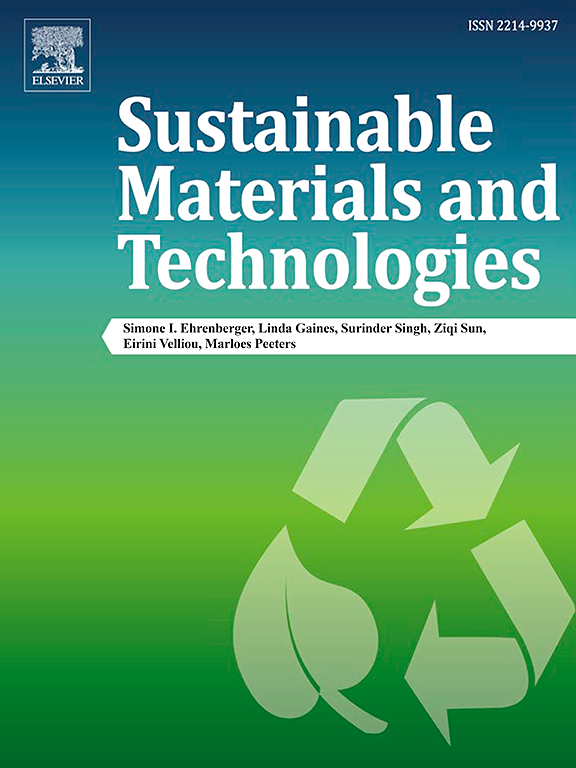Bio-compatible hydroxyapatite Nanoplatform wrapped covalent organic framework (COF) as sustainable stimuli-responsive nano-hybrid for multi-purpose nanocomposite coating
IF 9.2
2区 工程技术
Q1 ENERGY & FUELS
引用次数: 0
Abstract
A sustainable stimuli-responsive two-dimensional bio-compatible calcium phosphate based hydroxyapatite (2D-HA) nanoplatforms wrapped by green inhibitors (tannic acid and praseodymium) doped three dimensional covalent organic frameworks (PrTA-COF@HA) was designed for fabricating a multi-purpose epoxy (EP) nanocoating with unique anti-corrosion properties, active self-healing, high thermal durability and mechanical strength, and outstanding weathering resistance. Analytical techniques, including Fourier transform infrared spectroscopy (FT-IR), Raman, low-angle X-ray diffraction (XRD), Brunauer-Emmett-Teller analyses (BET), X-ray photoelectron spectroscopy (XPS), field emission scanning electron microscopy (FE-SEM), and high-resolution transmission electron (HR-TEM) were used to investigate the PrTA-COF@HA nanoplatform, and the obtained results revealed new properties of this nano-reservoir. The protective performance of the PrTA-COF@HA reinforced epoxy coating (EP/PrTA-COF@HA) was evaluated through some techniques including electrochemical impedance spectroscopy (EIS), accelerated salt spray test (A-SST), pull-off adhesion strength, cathodic disbondement (CD) test, tensile, dynamic mechanical thermal analysis (DMTA), and weathering resistance (QUV-A) tests. The intact EP/PrTA-COF@HA priming nanocoat showed excellent physical shielding against the brackish water (3.5 wt% of NaCl) with log |Z|10mHz = 10.30 after saline exposure for about 135 days. Furthermore, appreciable active self-healing property with an efficiency of about 41.25 % was observed for the defective EP/PrTA-COF@HA priming nanocoat after 8 h of immersion in the brackish water. The pull-off test revealed about 3.14 and 1.77 % loss of adhesion for the EP/PrTA-COF@HA priming nanocoat after 14 days of A-SST and 125 h of QUV-A exposure, respectively. The set of presented results and other extraordinary properties presented in the manuscript make this priming coat a prime choice for industrial applications in brackish marine environments.
生物相容性羟基磷灰石纳米平台包裹共价有机骨架(COF)作为可持续刺激响应的纳米杂化物用于多用途纳米复合涂层
设计了一种可持续刺激响应的二维生物相容性磷酸钙羟基磷灰石(2D-HA)纳米平台,该纳米平台由绿色抑制剂(单宁酸和镨)掺杂三维共价有机框架(PrTA-COF@HA)包裹,用于制造具有独特防腐性能、主动自修复、高热耐久性和机械强度以及出色的耐风化性的多用途环氧(EP)纳米涂层。利用傅里叶变换红外光谱(FT-IR)、拉曼光谱(Raman)、低角x射线衍射(XRD)、brunauer - emmet - teller分析(BET)、x射线光电子能谱(XPS)、场发射扫描电镜(FE-SEM)和高分辨率透射电子(HR-TEM)等分析技术对PrTA-COF@HA纳米平台进行了研究,所得结果揭示了该纳米储层的新性质。通过电化学阻抗谱(EIS)、加速盐雾试验(A-SST)、拉脱附着力、阴极剥离(CD)试验、拉伸、动态机械热分析(DMTA)和耐风化(QUV-A)试验,对PrTA-COF@HA增强环氧涂层(EP/PrTA-COF@HA)的防护性能进行了评价。完整的EP/PrTA-COF@HA底漆纳米涂层在盐水暴露约135天后,对log |Z|10mHz = 10.30的微咸水(3.5 wt% NaCl)表现出良好的物理屏蔽作用。此外,在微微水中浸泡8小时后,发现缺陷EP/PrTA-COF@HA纳米涂层具有明显的自愈活性,自愈效率约为41.25%。拉脱试验显示,经过14天的A-SST和125小时的QUV-A暴露后,EP/PrTA-COF@HA纳米涂层的附着力分别下降了3.14%和1.77%。在手稿中提出的一组提出的结果和其他非凡的性质,使这种底漆在咸淡海洋环境工业应用的首选。
本文章由计算机程序翻译,如有差异,请以英文原文为准。
求助全文
约1分钟内获得全文
求助全文
来源期刊

Sustainable Materials and Technologies
Energy-Renewable Energy, Sustainability and the Environment
CiteScore
13.40
自引率
4.20%
发文量
158
审稿时长
45 days
期刊介绍:
Sustainable Materials and Technologies (SM&T), an international, cross-disciplinary, fully open access journal published by Elsevier, focuses on original full-length research articles and reviews. It covers applied or fundamental science of nano-, micro-, meso-, and macro-scale aspects of materials and technologies for sustainable development. SM&T gives special attention to contributions that bridge the knowledge gap between materials and system designs.
 求助内容:
求助内容: 应助结果提醒方式:
应助结果提醒方式:


